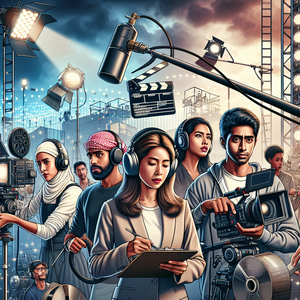
Producers vs. Directors: Navigating Roles and Career Pathways in Film Production
In the vibrant realm of film production, the interplay between producers and directors stands at the heart of the cinematic experience. These two roles, while distinct in their responsibilities, work in tandem to breathe life into scripts and transform ideas into captivating visual narratives.
Job Summaries:
Film Producer:
- Film producers oversee the entire lifecycle of a production, from concept to completion.
- They are instrumental in securing financing, organizing logistics, and managing budgets to ensure the film is completed on time and within financial parameters.
- Producers work closely with directors to align creative goals with practical needs.
- Typically, a bachelor’s degree in film or a related field, alongside strong organizational and negotiation skills, is needed for this role.
Film Director:
- The director is the visionary behind the film, responsible for making creative decisions that shape the narrative and visual style.
- They guide actors and crew, making choices on pacing, shot composition, and overall aesthetic.
- A background in film or theater is often required, complemented by a portfolio showcasing previous work.
Executive Producer:
- As a high-level manager, an executive producer plays a crucial role in the initial stages of a film's development.
- Focuses on financing and strategic oversight.
- Ensures that the project aligns with market trends and audience expectations.
- Often hires directors and producers.
Assistant Director (AD):
- An assistant director aids the film director in managing set operations.
- They coordinate schedules.
- They ensure that every aspect of production runs smoothly.
- They are vital for maintaining order, especially during complex scenes.
Production Manager:
- The production manager handles the daily operations of the film set.
- Overseeing budgeting, scheduling, and resource allocation.
- Working closely with producers and directors.
- They ensure the project stays on track.
Screenwriter:
- Screenwriters are the storytellers of the film industry.
- They craft scripts that serve as the foundation for cinematic narratives.
- They develop characters, dialogue, and plot structures.
- Screenwriters often collaborate with producers and directors to refine their work.
Casting Director:
- Casting directors play a pivotal role in selecting the right actors for each character.
- Conducting auditions.
- Negotiating contracts.
Editor:
- Editors are responsible for piecing together the film footage into a coherent final product.
- They work closely with directors to ensure that the editing aligns with the creative vision.
Cinematographer (Director of Photography):
- Cinematographers focus on the visual storytelling of a film.
- Managing lighting, camera angles, and shot composition.
Production Designer:
- Production designers are tasked with developing the overall visual concept of a film.
- The responsibilities include set design.
- Location selection is also part of their role.
Each of these roles contributes uniquely to the collaborative effort that defines filmmaking. As the film industry continues to evolve, understanding the responsibilities and skills associated with these positions will help aspiring filmmakers navigate their career paths with clarity.
Explore More Jobs

